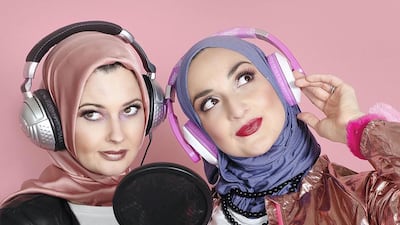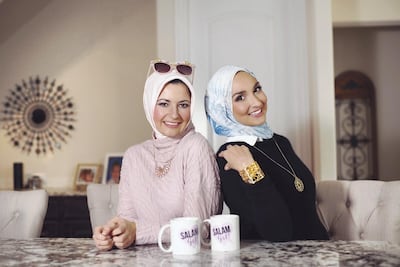"They just thought he was so hunky," says a chirpy voice in a southern American drawl over the sound system of my car. The speaker is recounting the story of the first time her American family met her Arab husband-to-be. They were half expecting to see someone who resembled the stereotypical picture that has been painted by some mainstream media in the West, but were happy to meet a friendly and personable face.
I'm tuned into Salam, Girl! – a podcast by Nicole Queen and Monica Traverzo, two American converts to Islam. From the first episode, where the duo laugh about styling their headscarves with butterfly clips in their early days of wearing the hijab to this episode, where words alluding to one's looks are being used, it's clear that this is no ordinary religious podcast. Yet religion is at the heart and soul of what motivates Queen and Traverzo, who categorise their work as dawah, the act of spreading or preaching Islam.
From conducting interviews with a hijab-wearing jiu-jitsu fighter, award-winning filmmaker, high-fashion make-up artist and official matchmaker, to tackling topics such as how divorce was dealt with during the time of the Prophet Mohammed and shedding light on initiatives such as Mu Delta Alpha – the first Muslim sorority in American colleges – Salam, Girl! has cultivated a community of like-minded women seeking to balance their faith with the demands of living in a westernised world.
Early beginnings
The show's hosts, who are based in Dallas, Texas, tell me that there was no "aha moment" or dramatic trigger that brought them to Islam; instead it was a gradual process that spanned years. "We were girls who loved to go out with our friends and dress up. I probably got a little crazier than Monica," says Queen. "I worked in the nightlife industry, and spent all of my time around people drinking, partying and that kind of thing. Eventually it just threw me overboard and I wanted to get back into the light." She started talking to some of the Muslim friends in her social circle about religion, and was given a Quran to read by her now-husband, Hasan.
Queen eventually converted to Islam in 2007, and became an avid speaker on the subject, taking to YouTube to post videos about converting, raising children and interfaith friendships. She would also speak at mosque youth groups about the religion, and it was at one of these talks that she met fellow convert Traverzo, in 2010. “We hit it off,” she says. “On the drive home, we just chatted and even when we got to my apartment, we just stayed there talking,” adds Traverzo.
When Queen made a YouTube video with one of her non-Muslim friends about her conversion, she found that her audience liked the dynamic of two voices, so she asked Traverzo if she was interested in starting a YouTube channel together. Traverzo, who had started listening to podcasts while running, suggested they host a joint podcast instead, and Salam Girl! launched last November.
The name of the show was born from the duo's colloquial style of chatting over the phone. "Monica is bubblier, and whenever she would call me she would be like: 'Salam, girl.' And I was like: 'Monica, that has to be our podcast name,'" says Queen. The two explain that their platform is one that today's young people can relate to, both in the West and beyond.
“We’re able to deliver dawah in a way that’s kind of modern and relatable to them, so that’s the cool part of the show,” says Queen, adding that their contemporary approach attracts non-Muslim listeners, too. “You have people curious about Islam and they can listen to American girls using the terminology, vocabulary and lingo that they’re used to, so we’re able to reach out to non-Muslim people in ways only a convert could.”
When the two speak at churches, for instance, they'll switch in "God" for "Allah", and if they use any Arabic terms, such as dawah or dunya (worldly), they'll make sure to translate them.
Growing their brand
The hosts tell me that in less than a year, Salam Girl! has been downloaded more than 60,000 times through platforms such as Apple Podcast and Spotify, and the number of views they got in their first 10 episodes has more than doubled since. The two are also on their way to becoming bona fide social media influencers: fashion, hijab, jewellery, lifestyle and childrenswear brands have joined Salam, Girl! as sponsors, sending products for the pair to post about on Instagram, where they maintain a carefully curated feed of Qurans, prayer beads, coffee mugs and interiors of mosques, in an array of pretty pinks and pastels.
In between recording shows, maintaining social media platforms and working side jobs, the two are mothers; Traverzo has four children and Queen has two. "We're mums first off, and we do this show even though I've got a PTA meeting and Monica's got stuff with her girls; no mum is just at home doing nothing," says Queen.
Their personal lives contribute to a great deal of their content – from stories about their conversions and struggles with styling hijabs to meeting their Arab in-laws and decorating their houses for Ramadan – and their banter often comes across as natural and unscripted. “Sometimes we wing it, we just chat, and those are our favourite shows, when we’re just talking as friends,” says Traverzo. “We want to create a sense of community, so we call our audience our girls, like, you’re our besties, too.”


